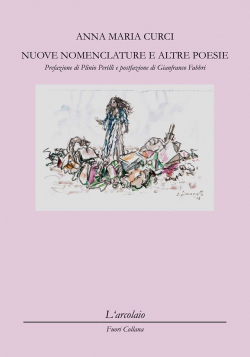Editorial
by Francesca Del Moro
“The bastard – he doesn’t exist!” exclaims Hamm in Samuel Beckett’s Endgame, angry with God. The same assumption defies any logic at the core of the poem by Claudia Zironi, a heartfelt accusation against a disastrous creator who is indifferent to the pain and divisions of which he is responsible. A conscious accomplice of evil is the supernatural being that is weakly outlined to be first invoked and then firmly rejected in Samuele Larocchia’s vivid lines, whereas the voice in Alessandro Silva’s visionary poem slowly distances itself from the Father and denounces a sort of vanitas sacrarum rooting in the lack of love. The absence of a divine being is peacefully accepted in Giorgia Monti’s largo and solemn lines, stitched with silence, that evoke an exclusively human spirituality, and a similar calm permeates the poem by Luigi Paraboschi, who draws up his own existential evaluation to submit to God at the moment of meeting him through an insistent series of vivid and refined images.
Before I meet you
by Luigi Paraboschi
before I meet you I will walk alone
along the path that always runs
next to every railway ballast
and I will lay my heart on the rail
as we used to do when we were young
with lemonade stoppers for fun,
it will become thin like a doorstop
to put under Heaven’s door
when it slams pushed by the night wind.
That day I will return you a life
lived at five-per-cent,
to quote Montale, for sure it
will be worn-out and full of stains
rips and betrayals
like a second-hand skirt
which is too old,
and finally I will stop being
the tip of a wing that flies against the wind
the cat’s cropped nail
that can’t hook the bark,
the cut tail of the green lizard
still darting after amputation.
Tell me, you
by Claudia Zironi
tell me, you
who only non-exist and remain silent
why I am so overcome
by disaster.
and yet here we are, alive, mistakes of yours and separated, evidence
of your fallibility, because if you had made us as one
all this pain wouldn’t exist. instead
there are sons, lovers, friends, killers, deranged people
and drunkards, like swears
walking through the world, without a single
vast thought of infinity.
and there is war, there is hate
there are illness and perversion.
there is even love.
Call
by Samuele Larocchia
Asking for help
to the supporter of your enemy
[the enemy is a behaviour:
absence].
Failed experiment.
Better to take the hands
away from the face.
Better to take the eyes
away from the wall.
STAND UP MONKEY!
I love you monkey.
Sitting beside my childhood bed,
as I slowly lace my shoes,
I think of a cauliflower.
Born yesterday
by Giorgia Monti
when the wind synchronises its steps with yours
when time nails down to its paraplegic structure
when the bite of duties is a ridiculous slash and the look is the only thing, the whole
here I am then
in the garden of a church
without consecration
blessed be
this only breath
Of the first man who abandons his Father
by Alessandro Silva
The time has gone to cultivate
the flowering of darkness. Fallen
under the sky, of burning things only
the sun and a poisonous hunger are left.
His throne, down here, is just a chair
between four stones sacredly raised. Alive
in names is the high narrator, with the
Father’s strong chest, he beats the ground
with crosses without tears nor sound.
Couldn’t I stay, extinguished memory,
between lambs of fire and choruses of light?
It is strange here, but it beats itself up in peace,
the pain, and the first thought looks
emaciated: I think he doesn’t love me anymore.
NUOVE NOMENCLATURE E ALTRE POESIE
The “new nomenclatures” mentioned in the title of this book by Anna Maria Curci – of which they actually represent the first of six chapters – may be identified with the words used by the poet to explore our present times. Anna Maria’s sharp look embraces the lessons of history and literature in its field of view – current topics such as immigration, the inner workings of the world of finance, the so-called flexible working, social inequalities, duplicity, selfishness and mistrust are dissected with a language that is sharp like a scalpel and with a surgeon’s steadfast hand. The refined and often harsh lexical choices implode in poems that are extremely dense and melodious, permeated by tensions and frictions. Irony is always present, it shapes above all the poems that sound like aphorisms, and is often turned into sarcasm. At times we feel we are wandering through a new version of Dante’s first realm, as suggested by the word “self-hell” in the poem Fuori classe. Within this scenario, the wounds of history open up over and over like mementoes – from World War II to Chile’s September 11 that recalls another September 11 of about three decades afterwards. Anna Maria shakes off the pre-eminence of communication: her lines consciously ask the readers to make an effort. Their purpose is to intrigue them with the visual force of the evoked scenes and the charming melodies created by a particular attention to sounds and silences and the mastery of various rhyme schemes (quatrains, couplets, sonnets, seven-syllable lines, octosyllables, double seven-syllable lines and endecasyllables, recurring rhymes and assonances). At the same time these poems push the readers to perform an in-depth analysis, to carry out researches in order to discover the overabundance of references and solve the riddles. Whipped and at first bewildered, we can’t help looking around to try and understand where the blow comes from, thus widening our perspective. There are plenty of references to beloved, studied and translated authors, mainly German-speaking (Brecht, Musil, Celan, Pastior, Andersch, Heine), and in German are most of the foreign words in the book and several titles. In addition to being a writer, translator and teacher, Anna Maria is a singer and the book also testifies to her love for music. All these elements merge in the tuning of an incisive writing which aims to trigger an intellectual work, heralding the comprehension of our present times.
Anna Maria Curci, Nuove nomenclature e altre poesie © 2015, L'arcolaio

